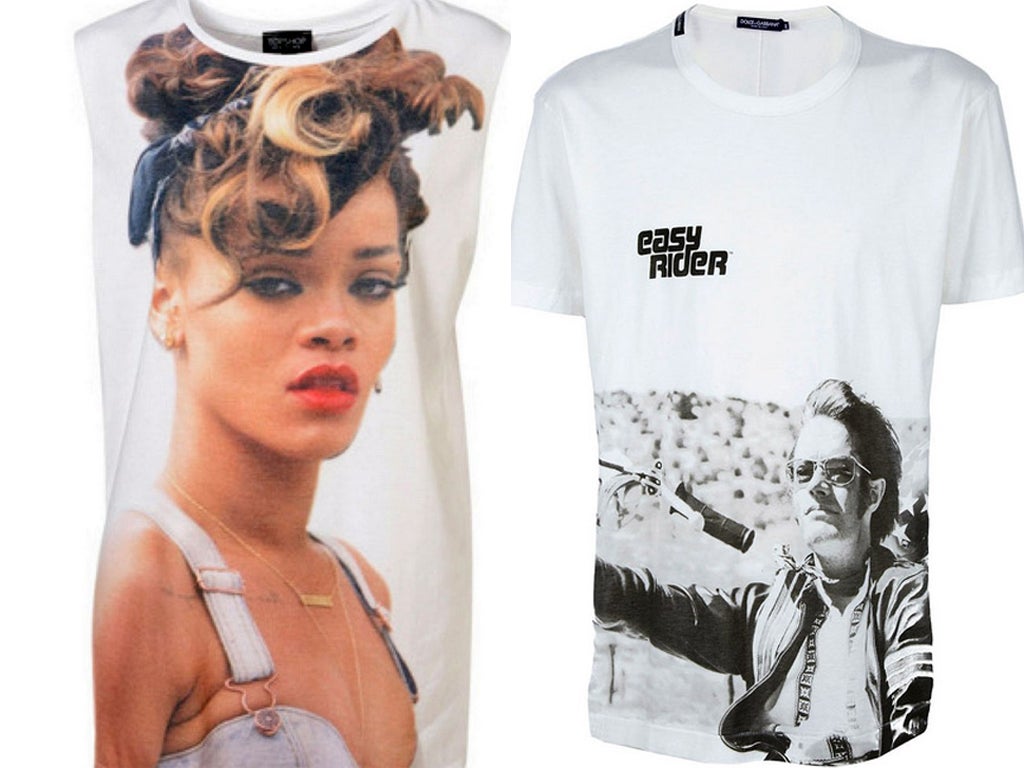From Rihanna to Peter Fonda: Your face here (whether you like it or not)
What do Peter Fonda and Rihanna have in common? Both have had their pictures appear on T-shirts without permission – and they’ve lawyered up. By Simon Usborne

Your support helps us to tell the story
From reproductive rights to climate change to Big Tech, The Independent is on the ground when the story is developing. Whether it's investigating the financials of Elon Musk's pro-Trump PAC or producing our latest documentary, 'The A Word', which shines a light on the American women fighting for reproductive rights, we know how important it is to parse out the facts from the messaging.
At such a critical moment in US history, we need reporters on the ground. Your donation allows us to keep sending journalists to speak to both sides of the story.
The Independent is trusted by Americans across the entire political spectrum. And unlike many other quality news outlets, we choose not to lock Americans out of our reporting and analysis with paywalls. We believe quality journalism should be available to everyone, paid for by those who can afford it.
Your support makes all the difference.You wonder how cross a 73-year-old Peter Fonda really was to discover the image of his younger self looking cool straddling a Harley on a T-shirt made by an Italian fashion label.
But cash is cash and Fonda is suing Dolce & Gabbana for using the 1969 still from Easy Rider without permission, claiming he has “suffered injuries to his peace, happiness, feelings, goodwill, reputation.. and [crucially, perhaps] future publicity value.”
The T-shirts, which sell for almost £200 at the US retailer Nordstrom (he’s suing them for good measure) are evidently such a threat to Fonda that he is demanding fees and any profits from sales on top of damages of up to $6m (£3.9m).
Nordstrom has said only that it was “aware” of the legal action while neither D nor G has commented, but one can only imagine both parties were already aware of the risks involved in slapping faces on shirts.
Last week, Rihanna was in a London court suing TopShop in a similar case. That is to say, her image was in court, on T-shirts displayed on a rack by the singer’s lawyers. They claimed on her behalf that the photograph, taken during a music video shoot in 2011, may have misled fans and damaged her reputation.
There are dozens of historic precedents, too, including the time, in 2011, Mike “The Situation” Sorrentino of Jersey Shore fame sued Abercrombie & Fitch over its T-shirts bearing the expression “The Fitchuation” (he lost the case earlier this month). Not only the famous are at risk. Last year, a fashion student was stunned to find a self-portrait from her blog on a Tesco sweater. The supermarket apologised and withdrew the garment.
Britain, it turns out, has none of the “misappropriation of image” laws celebrities use to protect their image elsewhere (in Germany, the goalkeeper Oliver Kahn used them to stop EA sports putting him in a computer game). Lawyers here must be more imaginative and draw on other legislation such as that concerning defamation or the “passing off” of goods as being those officially endorsed by the claimant.
Rihanna’s team took this approach, saying that the image used was “very similar” to those featured on the CD sleeve for one of her albums. But TopShop’s lawyers said it had paid the photographer for rights to use his photo. Alluding to the potential hypocrisy circling such cases, they also pointed out that any damage to Rihanna had not stopped her people requesting clothes from TopShop six times after she took the store to court.
The Dolce&Gabbana Group has now issued a statement saying it “was not aware of any legal action undertaken by Mr. Peter Henry Fonda until it was published on various media outlets.”
It adds: “the Group has not been informed of the terms of this alleged legal action as, up until today, it has not been officially notified in this sense.”
The “Easy Rider” T-shirts, it says, were created as part of an image rights contract with Sony Pictures.
Join our commenting forum
Join thought-provoking conversations, follow other Independent readers and see their replies
Comments